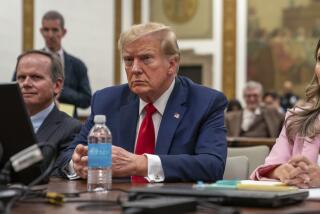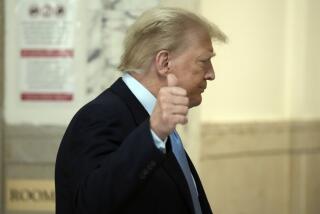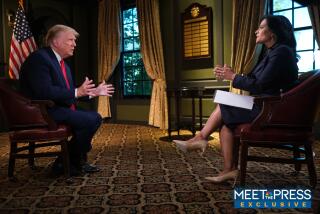Trump ends his tapes tease, with another tweet, but the damage is done — to him
For decades in his frequently public private life, Donald Trump’s flair for the dramatic was an asset.
But as president of the United States, Trump’s penchant for showmanship, verbal combat and short-term distractions has invited long-term difficulties.
That weakness was on vivid display Thursday as Trump sought to end a mystery of his own creation — whether he secretly recorded White House conversations with his fired FBI director, James B. Comey. He did not, Trump said.
His latest statement — on Twitter — seemed designed to clean up one of the most damaging backfires of his presidency: a 6-week-long game of tease that began with a tweet. That, in turn, played a major role in bringing about the appointment of a special counsel who now appears to be looking into obstruction-of-justice allegations against the president. However, the president closed off one controversy only to start a new one.
Forty-one days after hinting otherwise, Trump tweeted that no, he hasn’t been surreptitiously recording his conversations. Yet the president did not rule out the possibility that recordings exist — with Comey or anyone else. In fact, he seemed to raise the possibility that he believes his own intelligence and law enforcement agencies may be monitoring him.
“With all of the recently reported electronic surveillance, intercepts, unmasking and illegal leaking of information, I have no idea whether there are ‘tapes’ or recordings of my conversations,” he wrote.
“But,” he added, “I did not make, and do not have, any such recordings.”
The White House declined to answer additional questions sparked by the tweets. Deputy Press Secretary Sarah Huckabee Sanders said the president’s message was “extremely clear.”
“You guys asked for an answer. He gave you one,” she said.
Trump’s decision to finally resolve the tapes issue came shortly after Senate Republicans released their much-anticipated healthcare bill — a proposal he initially declined to endorse as it ran into immediate trouble within the party, though he did so hours later.
“He’s having fun with the press. He’s playing with the press. This is part of his whole presentation for most of his life, and he isn’t going to stop now,” said Stewart Baker, a former National Security Agency general counsel and an expert on national security law.
Nor, it has become clear, can his top advisors and lawyers stop him, despite the political and especially legal jeopardy that Trump has caused himself — not least by the “tapes” tweet directed at the FBI director he fired out of pique with the investigation of possible ties between Russia and his campaign in 2016.
Feuding publicly with Comey in the days after firing him May 9, the president first teased about a secret recording system in the White House, ominously tweeting, “Comey better hope that there are no ‘tapes’ of our conversations before he starts leaking to the press!”
Some viewed his tweet as an attempt to intimidate Comey and influence the ongoing investigation. Still, White House officials allowed the question of whether there were recordings to fester for weeks, leaving an opening for comparisons to Watergate. It was never clear whether his spokespeople were mute at the encouragement of their boss, or because they simply were powerless to get him to end the game.
Asked a month later if tapes existed and whether he would release them. Trump mischievously promised to answer, but not right away. Reporters wouldn’t like the answer, he added.
That promise of an answer came days after Comey testified this month before the Senate Intelligence Committee that he would welcome the release of any recordings if they existed.
“Lordy, I hope there are tapes,” he said.
Comey testified that he decided after the tweet to divulge his own contemporaneous notes of private meetings with Trump, in the hope — subsequently realized — that the Justice Department would name a special counsel for the Russia investigation. That inquiry extends to whether the president sought to obstruct justice by urging Comey to end the FBI inquiry.
Separately, the acting Republican chairman and senior Democrat in charge of the House Intelligence Committee’s Russia investigation formally requested that the White House turn over any recordings of Trump’s conversations with Comey by June 23.
Rep. Adam B. Schiff (D-Burbank), the ranking Democrat on the committee, said Thursday that Trump’s tweets alone on the eve of the deadline were not enough to satisfy their request for a formal written explanation from the White House counsel.
“If the president’s statement is accurate, it of course raises as many questions as it answers,” Schiff said in a statment. Among them: whether Trump was intentionally seeking to mislead the public and silence Comey, and whether he took similar steps to discourage other witnesses from coming forward.
“While I would certainly hope that the president’s most recent statement is true, we will continue to pursue the matter with other witnesses so that the public can be assured that if recordings were ever made, they will be preserved and be made available to the committee and ultimately to the public, as well,” Schiff added.
Sanders, Trump’s spokeswoman, sidestepped questions about whether the president meant to suggest that the CIA, FBI or other law enforcement and intelligence agencies might be monitoring Trump’s private conversations.
“He’s concerned with the number of leaks that do come out of our intelligence community. I think all America should be concerned with that,” she said. “There’s public record that talks about surveillance, that talks about unmasking. We know those practices take place.”
Thursday wasn’t the first time Trump has suggested he might be the subject of secret surveillance. In March, without evidence, he accused the Obama administration of wiretapping his phones during the 2016 election, calling it “McCarthyism.” The claim appeared to be based on unfounded reports in conservative media outlets. When it sparked a flurry of questions, the White House said it would not answer and instead asked Congress to initiate an inquiry on the matter, in connection with its ongoing investigation of Russian interference in the 2016 election.
Comey, then still serving as FBI director, and NSA Director Michael S. Rogers later testified before lawmakers that they could not verify the president’s allegation.
“I’m not going to try and characterize the tweets themselves. All I can tell you is we have no information that supports them,” Comey told the House Intelligence Committee.
By hinting that there may be surveillance recordings of his conversations held somewhere in the U.S. government, Trump is “going to have a lot of people believing that the ‘deep state’ was covering this guy forever, which was not the case,” said Frank Scafidi, a 20-year veteran of the FBI who ran its public affairs and congressional relations offices before retiring in 2004.
“I think this is as close as we are ever going to get to an admission from Donald Trump that he was spinning people in circles and he was lying about the tapes,” Scafidi said.
For more White House coverage, follow @mikememoli on Twitter.
Staff writer Brian Bennett contributed to this report.
ALSO
After a day on message, Trump slips back into old habits
In the Trump era, Obama nostalgia is a booming industry
Get live updates on our Essential Washington news feed
UPDATES:
6:55 p.m.: This article has been updated throughout for clarity.
This article was originally posted at 4:35 p.m.
More to Read
Get the L.A. Times Politics newsletter
Deeply reported insights into legislation, politics and policy from Sacramento, Washington and beyond. In your inbox three times per week.
You may occasionally receive promotional content from the Los Angeles Times.







